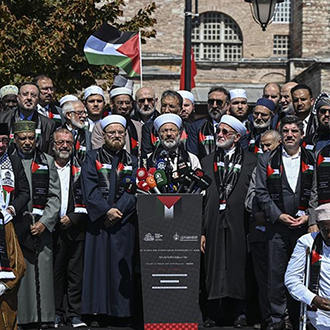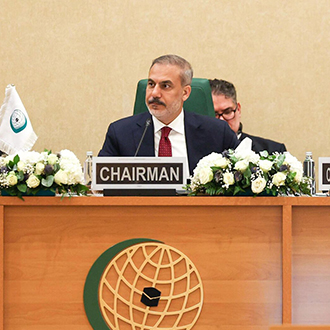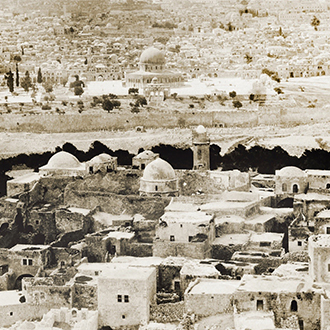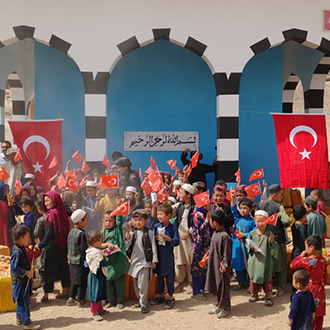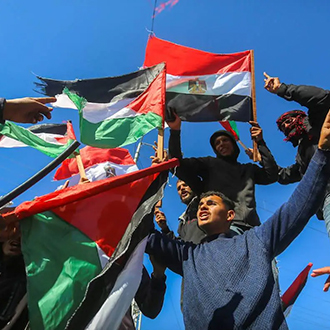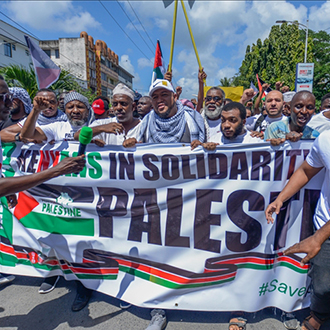The history of our nation, the geographies it has engaged with, and the resulting cultural heritage are so vast and inclusive that the relationships we establish with neighboring countries on this foundation serve as gateways to collaboration in all other areas. Solidarity, development, and a shared perspective become possible only in this way, with these common values manifesting in different forms depending on the country, sometimes as a prominent figure, sometimes as a literary work, a language, architectural structures, or shared memories.
At its core, YTB is a diaspora institution that strengthens our existing bonds with our spiritual geography through the lens of our culture and civilization while building new bridges of connection. As you know, we have a prophetic principle: “Actions are judged by intentions.” When our intentions are sincere, the outcomes are blessed accordingly. We approach our work with genuine dedication, seeking Allah’s pleasure in every step we take. Our motivation stems from the saying of an elderly woman from Western Thrace who said, “If Türkiye is well, so are we,” and the saying of an elderly Ahiskan Turk man who proclaimed, “Our hearts, minds, and souls are with Türkiye; our prayers are for you.” It is fueled by the love for Türkiye in the hearts of Nigerian Ahmed, Kazakhstani Bekzat, Azerbaijani Ali, and Egyptian Fatima, all of whom pursue their education in our country through the Türkiye Scholarships program. In short, we continue to approach our work with the devotion of worship, anchoring our morale and motivation in seeking the approval of Allah.
In your speeches, you frequently mention the concept of “geography of the heart.” What does “geography of the heart” mean, and what is required to become a part of it?
“Geography of the heart” is a beautiful and profound term we use to describe communities that have relationships with our country that go far beyond diplomatic formalities. Initially, this term was used to refer to communities in regions that are historically, religiously, nationally, and culturally close to us, with whom we share a common fate. In a broader sense, it refers to all communities and geographies, no matter where they are in the world, whose hearts beat for Türkiye, who rejoice and sorrow for Türkiye. Sometimes, we also use terms like “brother communities” or “cultural geography” instead of “geography of the heart,” but none of them are as effective, sincere, and heartfelt as the phrase “geography of the heart”.
Every place friendly to Türkiye, especially the Balkans, the Middle East, Turkistan, and Africa, as well as from Malaysia and Indonesia in Southeast Asia to Venezuela in South America, all fall within the borders of our geography of the heart. From the past to the present, anyone who shares in the noble heritage and struggle of our ancestors, who strove for the establishment of order in the world, peace, justice, and the enforcement of rights and laws, is part of our geography of the heart. For our goal is to enter the heart, act from the heart, and find a path from heart to heart. There are no other conditions for being part of our geography of the heart beyond what I have mentioned.
The moral, national, and spiritual values we hold are also influenced by the innovations brought about by globalization. However, the sense of compassion, a value shared by all societies and people, remains a virtue that binds people together despite all challenges. Can you speak about the need for compassion in the social and communal aspects of humanity today?
As you know, our religion is a religion of mercy. Our Prophet is the messenger of mercy and compassion. Our civilization is also built upon a path that places mercy at its core. The Prophet Muhammad (saw) said, “He who does not show mercy will not be shown mercy,” emphasizing the importance of mercy, which is one of our primary religious, moral, and human duties, and succinctly illustrating that the essence lies in being merciful. However, it is evident that in recent centuries, we find ourselves in an environment where worldliness has reached its peak, with egoistic and materialistic attitudes, focused solely on selfinterest, prevailing among the majority. In this environment, mercy has been abandoned, allowing the strong to oppress the weak.
Unfortunately, we see the most recent example of this in the deliberate genocidal campaign being carried out against our Gazan brothers and sisters for over a year. The merciless Israeli regime, which has not known compassion nor shown it, is ruthlessly killing unborn children, the elderly, and the sick without hesitation. The entire world merely watches this brutality unfold. Except for Türkiye and a few other countries, there is no voice raised against the Zionist vandals. In reality, it is not just our Palestinian brothers and sisters who are being killed, but the very sense of compassion for the ummah and all of humanity. Yet, this fact remains unnoticed. I do not know if humanity has ever experienced a period in history when it was in such dire need of compassion, but it is certain that it is compassion that will save humanity, and if we are to rise again, it will be through mercy.
What do you think should be done to spread the awareness of compassion to both individuals and communities?
In my humble opinion, humanity must return to its original state of creation and gaze into their own hearts. Human beings, who are inherently pure and have the seed of beauty and compassion in their nature, should cleanse the ashes of compassion in their hearts and ignite the flame of the heart that will enlighten them both materially and spiritually. They should prioritize truth, goodness, and righteousness, and never let go of justice and compassion. People who progress in all these aspects become beautiful examples through their way of life, transitioning from word to action.
The best example is to live sincerely and teach through living. In this way, the behavior affects the interlocutor. As the elders say, one’s state is contagious. In this manner, mercy, which is the essence of beauty, reflects from the individual to society and spreads. Promoting good morals, compassion, and kindness should be our fundamental duty, and we must view this as both a religious and human responsibility. Without a doubt, it will be those whose hearts flow with the waters of mercy who will save the world, and the future will be shaped by their merciful hands.
How can we use the ethics of compassion to combat hate speech and the spread of anti-other rhetoric around the world? In the face of the immense destruction and oppression we see today, especially in places like Palestine, how can we mend a world devoid of compassion?
Since the dawn of time, humanity has been entrenched in the struggle between the self and the other. We are all familiar with the story of Abel and Cain. Selfishness fuels hatred, and the first blood is shed. As human beings, we all carry a soul that inherently seeks its own desires and craves self-centered consideration. From this inclination emerges a pervasive sense of hatred and the perception of “otherness,” which extends from individuals to the collective character of societies. However, in our understanding, human beings are the most noble of all creations. Sadly, this noble being disrupts the divine order and sows corruption on earth by acting contrary to their purpose of creation. As the Qur’an describes, they descend to “asfal al-safilin”, the lowest of the low. Through their deliberate and willful actions, they defy both the Creator and creation. When we consult experts on such matters, the 11th verse of Surah al-Baqarah immediately comes to mind: “When they are told, ‘Do not spread corruption in the land,’ they reply, ‘We are only peacemakers!’” Unfortunately, even today, the mercy-deprived Israeli regime claims to be a peacemaker while exterminating humanity. They trample upon all human, moral, and civilizational values under this pretext.
As I have expressed before, we need to embark on a journey of returning to our essence. Instead of focusing on “I”, we must strive to embrace “we”, attaining a maturity that prioritizes others over our own desires. When we unite as one, those who perpetuate division, incite hatred, and replace love and harmony with chaos and conflict will ultimately lose. We must cling to the rope of tawhid that our Lord has provided and be colored by His paint of wahdah. Once this state is achieved, the poison of those who sow seeds of hatred, thrive on blood and tears, and lack compassion will, inshallah, have no effect on us.
I would like to particularly emphasize this point. As YTB, we are deeply concerned about the spread of pathological ideologies such as Islamophobia and Turkophobia, especially in the West, and the adverse impact these issues have on our citizens as well as our kin and co-religionists. As an institution, we have established a platform called NESAM (Portal for Combating Hate Crimes and Discrimination). Through this site, individuals who experience hate crimes, discrimination, or rights violations can report these incidents to us. In turn, we assist them in various ways, including documenting these crimes, providing legal support to the victims, and more. The reports we prepare are shared with relevant counterparts abroad, and we diligently follow up on these matters.
Finally, what message would you like to convey to our readers?
As an institution, we remain steadfast in our commitment to our activities for our citizens living abroad, our kin and related communities, and the international students we host in our country. Like a master weaver patiently threading each stitch, we proceed on our path, steadily achieving positive results in the medium and long term. With the motto, “Wherever there is a citizen, kin, or related community of ours in the world, we are there”, we strive to serve wholeheartedly. At YTB, we remain committed to ensuring that all our plans, projects, and programs align with the mutual interests of Türkiye and the respective countries we engage with while extending a hand of compassion and sincerity to our geography of the heart.
Finally, I pray to Allah the Almighty for the swift extinguishing of the flames of oppression, injustice, and inequity engulfing the Islamic world and the entire globe, for the relief of all the oppressed, wherever they may be in the world, starting with our brothers and sisters in Gaza, and for the establishment of a system rooted in compassion and justice, with the conviction that a just world is possible.




